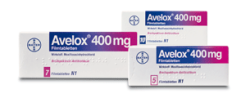Top Class Actions’s website and social media posts use affiliate links. If you make a purchase using such links, we may receive a commission, but it will not result in any additional charges to you. Please review our Affiliate Link Disclosure for more information.

Quinolones like Avelox are a family of antibiotics entirely synthetic in origin. Most other families of antibiotics are, or are derived from, naturally occurring chemicals. Penicillin, the classic example, is produced by a fungus. While bacteria, fungi, and other organisms have produced a variety of useful chemicals, the quinolone family was developed with the hope that a wholly-artificial antibiotic would be harder to adapt to, countering the problem of antibiotic-resistant bacteria. However, quinolones have several serious potential side effects.
One serious side effect seen in Avelox is liver damage. This stems from the way the body breaks down drugs. The liver breaks many drugs down, either into smaller molecules or more soluble ones, making it easier for the body to rid itself of drugs. These new chemicals produced by the liver are called secondary metabolites. However, this process can misfire, and the body can sometimes produce toxic secondary metabolites from drugs like Avelox. This process varies wildly from one individual to another, so it is very difficult to predict who could suffer liver damage from Avelox or other quinolones.
According to the National Library of Medicine, liver toxicity is seen more often in Cipro and Levaquin than with Avelox. However, the entry notes that this could easily stem from the fact that these drugs are much more widely prescribed than Avelox, and that rates of liver toxicity and liver failure were probably comparable for Avelox. The entry also notes that several quinolones were pulled from the market in the 1990s after reports of serious liver problems, including liver toxicity and liver failure, were reported. Liver failure from secondary metabolites is not unique to quinolones, but it is a concern with this family of antibiotics.
Liver toxicity with quinolones like Avelox typically takes place one to four weeks after starting treatment. Signs of liver failure can include yellowing of the skin and eyes (“jaundice” in medical terms), nausea, vomiting, weakness, fatigue, and pain in the upper right-hand portion of the abdomen. Liver failure is a medical emergency, and can be fatal. The liver is a very resilient organ under ideal conditions, but recovery from liver failure typically takes weeks or even months. And total liver failure can only be fixed with a liver transplant to replace the dead organ.
In general, quinolone lawsuits are filed individually by each plaintiff and are not class actions.
Do YOU have a legal claim? Fill out the form on this page now for a free, immediate, and confidential case evaluation. The attorneys who work with Top Class Actions will contact you if you qualify to let you know if an individual lawsuit or class action lawsuit is best for you. Hurry — statutes of limitations may apply.
ATTORNEY ADVERTISING
Top Class Actions is a Proud Member of the American Bar Association
LEGAL INFORMATION IS NOT LEGAL ADVICE
Top Class Actions Legal Statement
©2008 – 2024 Top Class Actions® LLC
Various Trademarks held by their respective owners
This website is not intended for viewing or usage by European Union citizens.
Get Help – It’s Free
Join a Free Quinolone Class Action Lawsuit Investigation
If you or someone you know took Cipro, Levaquin, Avelox or another quinolone antibiotic and were diagnosed with liver failure, Stevens Johnson Syndrome (SJS) or toxic epidermal necrolysis (TEN), you may have a legal claim. See if you qualify by submitting your information below for a free and confidential case review.
An attorney will contact you if you qualify to discuss the details of your potential case at no charge to you.
Oops! We could not locate your form.












